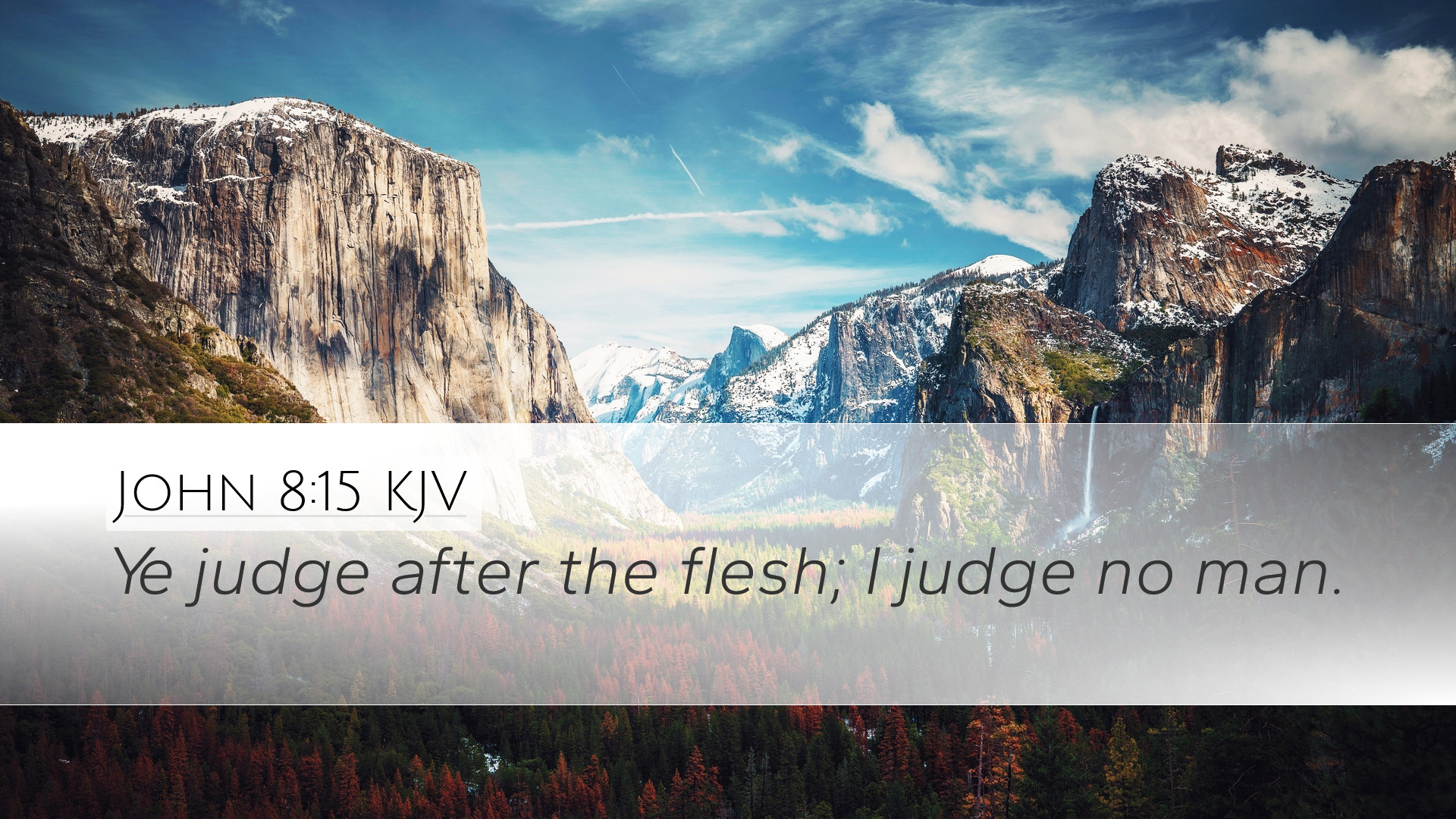Commentary on John 8:15
Verse: "You judge according to the flesh; I judge no one."
In this profound verse, recorded in the Gospel of John, we find Jesus contrasting human judgment with divine judgment, a theme prevalent throughout His ministry. The dichotomy between 'flesh' and 'spirit' serves as a backdrop for understanding Jesus' divine role and the nature of righteous judgment.
1. Contextual Background
Understanding the context of John 8 is crucial. This chapter occurs during the Feast of Tabernacles, a time of joyous celebration for the Israelites, where Jesus publicly challenges the religious leaders' understanding and interpretation of the Law.
- Historical Setting: The Israelites commemorated God's deliverance through the wilderness, which helps shed light on Jesus’ metaphorical language concerning 'light' and 'judgment'.
- Religious Tensions: The ongoing conflict between Jesus and Jewish authorities increases in intensity, creating a backdrop of hostility and skepticism about His identity and mission.
2. The Contrast of Judgment
Jesus states, "You judge according to the flesh," indicating that the judgments made by the Pharisees stem from a human perspective, influenced by earthly standards and appearances. This fleshly judgment lacks the depth and insight of divine evaluation.
- Matthew Henry: He emphasizes that fleshly judgments are based on external appearances, lacking the ability to discern the heart and intentions of individuals.
- Albert Barnes: Barnes notes that the judgment of the Pharisees was often hypocritical, basing their decisions on legalistic interpretations rather than spiritual truths.
- Adam Clarke: Clarke points to the spiritual blindness of the authorities, who could not see the truth of Jesus’ mission because of their rigid adherence to tradition.
3. The Nature of Christ's Judgment
In contrast, Jesus asserts, "I judge no one." This statement reveals a profound truth about His mission; while He carries the authority to judge (as the Son of God), He operates from a place of grace and a desire for redemption rather than condemnation.
- Mercy vs. Judgment: Jesus’ approach embodies mercy, exemplified in His later interactions, especially in the story of the woman caught in adultery (John 8:1-11). He seeks to save and restore rather than solely to pass judgment.
- Spiritual Authority: His claim of not judging anyone indicates His role as the Savior, whose ultimate judgment will come at the final day, rather than during His earthly ministry.
- Context of Discipleship: The phrase hints at discipleship; followers of Christ are called to a similar outlook, to discern with love and grace rather than condemnation.
4. Implications for Believers
This interplay between judgment and grace is particularly significant for contemporaneous believers. Understanding this verse not only impacts theological views but also informs the practical lives of Christians.
- Call to Discernment: Believers are encouraged to look beyond surface judgments, cultivating a heart that seeks to understand others' motivations and circumstances.
- Emphasis on Grace: Followers of Jesus are reminded to embody grace in their relationships, emulating Christ's position of not condemning but extending love and forgiveness.
- Witness in Community: The Christian community must be a place of safety where individuals feel free to seek truth without fear of harsh judgment.
5. Conclusion
John 8:15 serves as a powerful reminder of the nature of true judgment and the example set by Christ. It challenges pastors, scholars, and laypersons alike to reflect on their own attitudes and practices regarding judgment. By embracing a Christ-like perspective, believers can foster an environment rooted in grace that reflects the heart of the Gospel.


